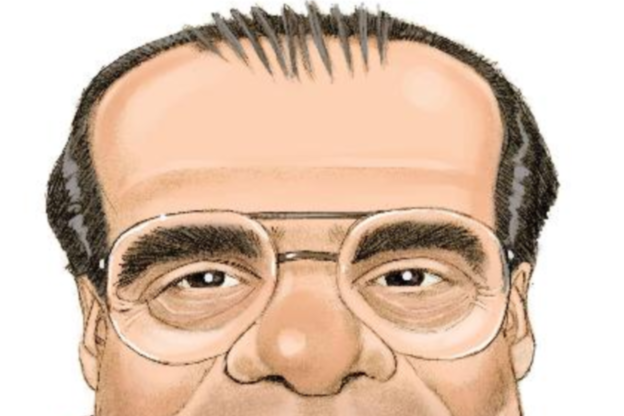

Scalia, um, explained
There were two op-eds in the Star Tribune on July 3rd, purporting to unpack Supreme Court Justice Antonin Scalia’s thinking. One is by Cass Sunstein, and the other is by Noah Feldman. They’re both professors at the Harvard Law School. I am sure the professors are much more familiar with the oeuvre of the longest sitting Supreme Court Justice than I am, but I am reminded of the defense a parent or sibling sometimes mounts on behalf of a child — because you have to. Scalia, of course, in a Harvard grad.
But there were a few things that seemed — maybe just to an untutored plebeian such as myself — well, not exactly right. First, here’s Sunstein:
Perhaps [Scalia’s] central goal has been to promote the rule of law, which (as he contended in an important essay in 1989) is “a law of rules.” He seeks to increase predictability. He favors general rules, not case-by-case judgments.
In his view, such rules simplify life for ordinary people and the legal system. They also reduce the danger that political preferences will dominate judicial decisions.
This is a fairly garden-variety case for stare decisis. But it’s a laugher when applied to Scalia. The case that first came to mind in this context is Scalia’s opinion in District of Columbia v. Heller which held, well, let’s get it from the Court’s syllabus:
The Second Amendment protects an individual right to possess a firearm unconnected with service in a militia, and to use that arm for traditionally lawful purposes, such as self-defense within the home.
Here’s the text of the Second Amendment:
A well regulated militia, being necessary to the security of a free state, the right of the people to keep and bear arms, shall not be infringed.
And after many, many decades of jurisprudence to the contrary, son of a gun, it took Tony Scalia in 2008 to figure out that the predicate language was meaningless. Scalia channels the framers of the constitution regularly, I guess.
And then there is this:
As an “originalist,” Scalia believes that provisions of the Constitution mean what they meant at the time that they were ratified. [emphasis added] He thinks that originalism increases predictability and ensures the sovereignty of We the People. The meaning of constitutional provisions is a question of history, not morality.
Except when they don’t, apparently. But Scalia was certainly original when he found this new right that lay undiscovered since ratification of the Constitution, or maybe the ratification of the 14th Amendment, as applied to the states.
There has been a lot of ink spilled over this issue since 2008, and I don’t intend to rehash it, save to say that Scalia doesn’t pay as much attention to the bare language of the Constitution as Sunstein suggests, especially when it suits him, and he’s plenty result oriented, too, when you get right down to it.
That is what the uproar over Scalia’s contradictory opinions in the affirmative action and voting rights cases, on the one hand, and DOMA decision dissent, on the other, is all about. But really, they aren’t contradictory at all, if you’re looking for the conservative result.
Professor Feldman writes:
Scalia is a unique figure on the bench, saying things other justices don’t even think. As a law professor, I couldn’t do without him, and I love hearing him articulate the most extreme positions with implacable logic and a total lack of filter.
Yes, Professor, he’s a gas, all right! It must really be funny when he and Thomas tell fart jokes in conference, especially in front of the ladies. Oh, to be a fly on the wall in there!
But there are a lot of us who don’t care much for bully-boy jurisprudence by the senior jurist in the United States. A smart jerk is, after all, still a jerk.
Thanks for your feedback. If we like what you have to say, it may appear in a future post of reader reactions.

